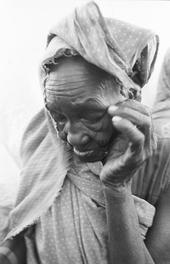Create your own at MyNiceSpace.com
Darfur, the western region of Sudan,
is home to an estimated six million people. It is also the battlefield on which the 21st century's first genocide rages.
400,000 have already been killed.
2.5 million are displaced.
3.5 million are hungry.
80 – 90% of all villages in Darfur have been decimated.
Darfurians who make it to the crowded refugee camps along the Sudan-Chad border are plagued by lurking Janjaweed militias and inadequate food, water, shelter, healthcare, and sanitation.
The situation in Darfur is complex, resulting from many historic, social and cultural forces.
Unequal distribution of economic resources and general neglect of the Darfur region prompted a rebellion against the Sudanese government in 2003.
The two main rebel groups, the Sudanese People’s Liberation Army (SPLA) and the Justice and Equality Movement (JEM), claim that the government is oppressing black Africans in favor of Arabs.
Those most affected belong to the Fur, Masalit, and Zagawa tribes. These communities, already struggling with drought and food shortages, have been the target of ongoing violence by the Sudanese government for several decades.
In response, the Sudanese government (often referred to as Khartoum, which is the capital of Sudan) is backing Janjaweed militias as they murder, rape, loot, and expel non-Arab Africans from Darfur.
Though the government denies that they are connected to the Janjaweed, hard evidence shows that they have aided the militias by providing them with arms and enhancing attacks with aerial bombardment.
The tactics of the Janjaweed, including the systematic poisoning of wells and burning of food stores, indicate that the dispute is not over land or resources.
Nor is it a religious conflict. Khartoum is utilizing the historic animosity between the region’s mostly “Arab†nomadic herders and “African†settled farmers for its own benefit.
By generating anarchy, the government weakens the position of its enemies. Though the United Nations is unwilling to label the crisis genocide, it admits that the Government of Sudan is perpetrating ethnic cleansing against its own civilians.
The term genocide is defined in Article 2 of the Convention on the
Prevention and Punishment of Genocide as:
Any of the following acts committed with intent to destroy, in whole
or in part, a national, ethnical, racial or religious group, as such:
(a) Killing members of the group;
(b) Causing serious bodily or mental harm to members of the group;
(c) Deliberately inflicting on the group conditions of life calculated to
bring about its physical destruction in whole or in part;
(d) Imposing measures intended to prevent births within the group;
(e) Forcibly transferring children of the group to another group.
A United Nations Commission of Inquiry found evidence of systematic rape, burning, looting, and other crimes against humanity occurring throughout the Darfur region. The use of rape as a weapon is a hallmark of this crisis. President Bush classified the crisis a genocide in September 2004. The U.S. was the force behind a U.N. Security Council statement that began preliminary planning for the possible deployment of U.N. peacekeepers to Darfur.
Though the need has been recognized, international troops have not been officially pledged to Darfur.
All that stands between the Janjaweed and innocent civilians are the 7,000 under-funded, under-armed African Union troops currently in Darfur, an area the size of Texas or France. (The city of Dallas, Texas, alone is patrolled by 3,000 officers). (The French National Police has 150,000 employees.)
Their current mandate allows for observation only. Though the African Union presence has been shown to deter attacks in some situations, AU troops cannot offer outright protection to Darfurian civilians.
The AU will be pulling out of Darfur soon. The U.N. hopes to deploy peacekeepers by January 2007 at the earliest.
There are several obstacles.
Troops take time to deploy, and the logistical and financial support of U.N. member states is both necessary and unlikely to be timely. Sudan, a sovereign nation, has stated that it will refuse to admit peacekeepers. The U.N. is pressuring Khartoum with little success. The situation on the ground continues to disintegrate. The scorched-earth nature of the campaign is evidence of an attempt to exterminate the non-Arab Africans.
An expanded international peacekeeping force with the mandate to protect civilians could stop the genocide—if it is deployed in time.
Over 400,000 lives have been lost so far, they need our help now and not just words.div.layoutbutton h1 a:hover { background-color: transparent; text-decoration: underline; color: #ffffff; background-color: rgb(0,151,253);
